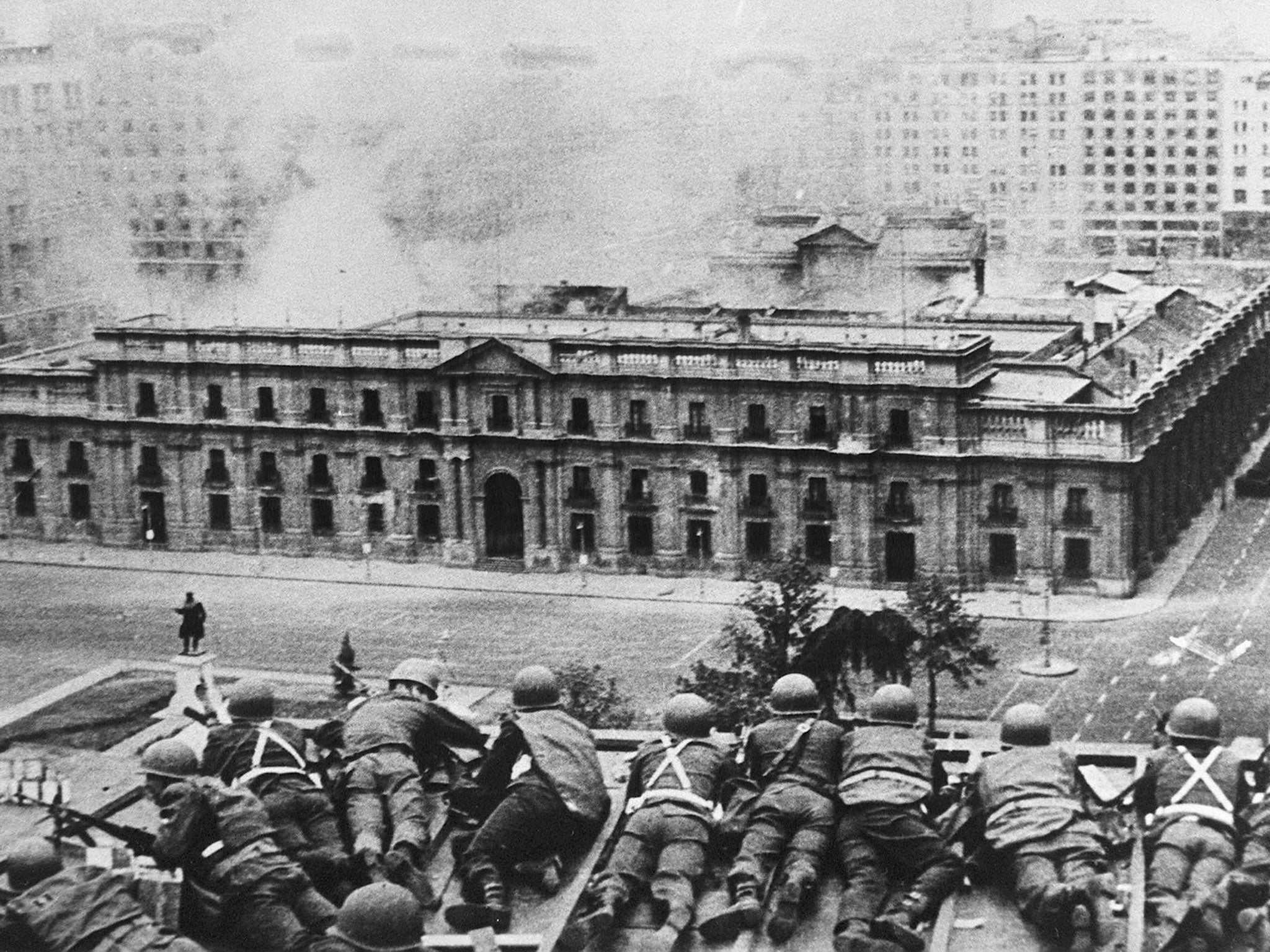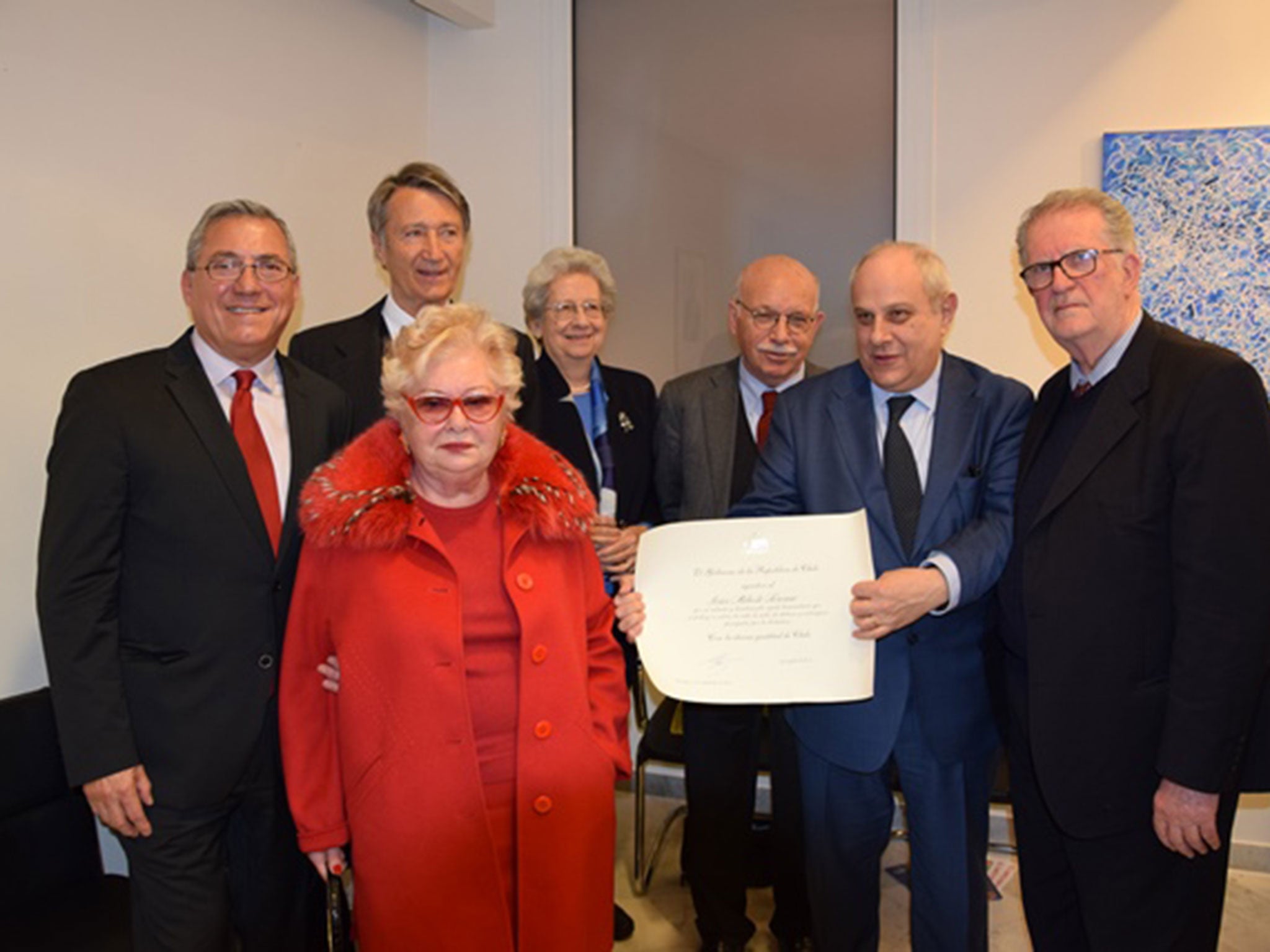Chile honours Italian diplomats whose ‘Schindler’s List’ saved 750 lives during Augusto Pinochet's brutal regime
When Pinochet’s terror was at its height, there was one place of refuge for the persecuted leftists: the Italian embassy in Santiago. Four decades on, the diplomats’ bravery has finally been recognised

There was little room for doubt as the corpse of a murdered dissident was thrown into the walled garden of the embassy. Italian diplomats knew then, if they had not before, that they had gained the attention – and opprobrium – of Augusto Pinochet, the supposed friend of the British government whose regime terrorised Chile for 17 years.
The naked body was that of left-wing activist Lumi Videla, one of thousands tortured to death as the US-backed dictator squeezed the life out of any political resistance after seizing power in 1973. The bodies began to mount up. The dead included students, the homeless and trade union members.
But hundreds more fortunate Chileans were able to seek refuge in foreign embassies, and now, the government of Chile has recognised the outstanding role played by Italy in providing a diplomatic lifeline for those under threat.
Chile’s current ambassador to Rome, Fernando Ayala, presented Diplomas of Honour to Rome’s diplomats in Santiago in the early 1970s, who saved the lives of up to 750 Chileans with their own “Schindler’s List”, hiding them in the Embassy grounds and escorting many out of the country with specially prepared diplomatic passes.
Mr Ayala said that the awards, given to five senior Italian officials, were “a symbolic act, an acknowledgement to the great generosity of all Italians to the Chileans persecuted by the dictatorship in the Seventies”.
He added: “I want to thank again in the name of the government of Chile all the Italian governments... that never once failed to condemn the military dictatorship of Pinochet, and allowed hundreds of Chilean families into Italy to start new lives.”
“We didn’t plan to do anything at the beginning,” said Roberto Toscano, second secretary to Rome’s Ambassador in Santiago during the first two blood-soaked years after General Pinochet came to power. “It just happened. The first to arrive after the coup were Chilean-Italians, who we had to protect. Then many others who jumped over the wall and took refuge in the residence.”

Mr Toscano, then an inexperienced second secretary and his superior Piero de Masi, the chargé d’affaires, were in charge in the absence of Italy’s ambassador, Tomaso de Vergottini, who had not been allowed back into Chile after Italy refused to recognise the legitimacy of the Pinochet regime. “In some periods there were up to 250 refugees in the Embassy at the same time. There were only five or six bathrooms available and it formed a long line just to wash and shave,” Mr Toscano told La Repubblica.
Then came the incident of Ms Videla’s body being thrown into the Embassy grounds in November 1974. The Pinochet-controlled press declared she had been tortured and killed during an orgy in the embassy involving left-wing dissidents. The regime sought to use this as an excuse to force its way into the embassy and clear out the political refugees.
With the Pinochet regime’s patience finally wearing thin, Mr Toscano was declared “persona-non grata” and forced to leave Chile by the end of 1974. He went on to become Italy’s ambassador in India and Iran.
Other opponents of the dictatorship to hide out in the Italian embassy included Silvano Girotto, also known as “Brother Mitra”, a former Franciscan monk and leftist militant, who later became familiar in Italy after collaborating with Italian authorities in the capture of the Red Brigades’ terrorist leader Renato Curcio. Mr Girotto had come from Bolivia to Chile to aid the fight against the Pinochet dictatorship. “He had a shoulder injury,” said Mr Toscano, “We treated him and then he left for Italy.”
The Italian diplomat recalled how the Franciscan resistance fighter left a large gun in the embassy, hidden in a sack of powdered milk.
Mr Ayala said other countries, some in Latin American, helped dissidents during “the darkest period in Chilean history”; among the European embassies most active in saving Chileans were the Swedish and Italian embassies. The embassy of the US, which engineered Pinochet’s brutal coup against the far-left, democratically elected government of Salvador Allende was not much help. But neither was the British Embassy, said Mr Toscano.
Britain’s indifference to the crimes of Pinochet appeared to have passed when it agreed to a request by Spanish magistrates to arrest the dictator in October 1998, while he was visiting the UK for medical treatment. But the first seizure of a former head of state travelling on a diplomatic passport on British soil, also provoked the wrath of senior Conservative politicians, including Margaret Thatcher and Norman Lamont. They were dubbed “Tories for Torture” by the leading human rights lawyer Geoffrey Robertson. Nonetheless, a campaign to free the dictator saw him return to Chile 18 months later. Pinochet finally made way for a return to democratic government in 1988.
La Repubblica called the actions of Italian diplomats in Santiago in the early 1970s, “one of the most beautiful and moving pages in the history of our international solidarity”. “When I accompanied the persecuted Chileans to the airport safe and sound,” Mr Toscano said, “I thought being a diplomat was the best job in the world.”
He also compared, unfavourably, his country’s generosity then with Europe’s current attitude to Syrian refugees. “Our indifference is shocking,” he said. “I think it’s because politics is dead and we live in the time of fear. The story of the solidarity we saw in the years of the Pinochet coup gives us some idea of how much we’ve changed today.”
Join our commenting forum
Join thought-provoking conversations, follow other Independent readers and see their replies
Comments
Bookmark popover
Removed from bookmarks